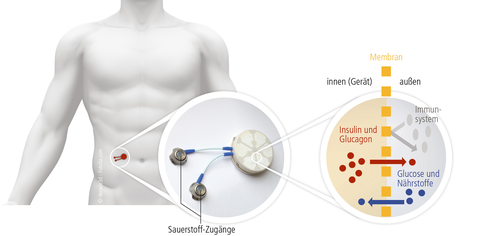May 27, 2016
DFG: extension for two Collaborative Research Centres of TU Dresden
DFG approves an extension for TU Dresden’s two Collaborative Research Centres (CRC) in the fields of psychology and medicine
The Deutsche Forschungsgemeinschaft (DFG, German Research Foundation) has announced today (27th May 2016) that the Collaborative Research Centre (CRC) 940 „Volition and Cognitive Control: Mechanisms, Modulators and Dysfunctions“ run by TU Dresden’s Department of Psychology will be funded for a further four years. Additionally, the CRC/Transregio 127 “Biology of xenogeneic cell, tissue and organ transplantation –from bench to bedside“ will be extended.
SFB 940 “Volition and Cognitive Control: Mechanisms, Modulators and Dysfunctions“
Elucidating the cognitive and neural mechanisms underlying self-control and volitional action
Which cognitive mechanisms and neural systems underlie the ability to exert volitional control over one’s actions and emotions? Why do people frequently fail to resist short-term temptations or fail to overcome strong competing habits while pursuing important long-term goals? Why does volitional control break down in mental disorders such as addictions or eating disorders? These are some of the core questions that are investigated at TU Dresden’s Collaborative Research Centre (CRC 940) “Volition and Cognitive Control: Mechanisms, Modulators and Dysfunctions”, which has been funded by the DFG since 2012. The interdisciplinary research team consists of psychologists and cognitive neuroscientists at the TU Dresden and cooperation partners of the Charité Berlin and is led by Prof. Thomas Goschke. Based on the CRC’s excellent evaluation by an international review committee, the DFG has now approved a second funding period of four years, with a funding volume of over 10 million Euros.
The CRC’s goal is to elucidate the cognitive and neural mechanisms underlying the ability to exert volitional control over one’s actions and emotions as well as to investigate impairments of self-control in selected mental disorders. During the first four-year funding period, the CRC has gained numerous novel insights into the mechanisms of volitional action control. With the help of advanced functional neuroimaging methods, they were able to determine in which regions of the prefrontal cortex intentions are maintained prior to their execution and, if necessary, are shielded against disruptive environmental stimuli or unwanted behavioural impulses. Furthermore, major advances were made in elucidating brain systems governing the control of flexible, goal-directed action in contrast to automatic or habitual behaviour.
Building on these insights, in the second funding period the scientists will examine if dysfunctions in brain systems mediating cognitive control constitute a risk factor, which predicts an increased proneness to commit daily self-control failures or to develop addictive behaviours. Further aims are to examine why volitional self-control is impaired under chronic stress, how cognitive control is modulated by specific neurotransmitter systems and how this modulation changes across the life span, and which neurocognitive mechanisms underlie dysfunctions of cognitive control in anxiety and eating disorders.
Media Inquiries
Prof. Dr. Thomas Goschke
Tel.: +49 (0) 351 463-34695
CRC/Transregio 127: “Biology of xenogeneic cell, tissue and organ transplantation –from bench to bedside“
The DFG will fund a research programme on xenotransplantation for a further four years, which is unparalleled worldwide with a total funding volume of over 15 million Euros. It is a collaboration project between TU Dresden, the Ludwig-Maximilian University Munich, the TU Munich and the Medical University Hanover as well as four other research institutions. The prestigious King’s College London is also part of the project and is closely connected to TU Dresden, through the “TransCampus” initiated by the Faculty of Medicine Carl Gustav Carus. The goal is to find a solution to the significant shortage of donor organs for patients with heart diseases and diabetes by using genetically modified pig organs and pig cells.
Through this funding Prof. Stefan Bornstein, the speaker for Dresden, and his diabetes team are provided with an opportunity which is unique in the world: to offer new therapies for patients with diabetes and severe fluctuations in the blood sugar levels, using a bio-chamber with insulin-producing pig cells.
This funding will strengthen the Dresden-based university medicine with the Faculty of Medicine and the University hospital Carl Gustav Carus Dresden as a leading diabetes centre.
http://www.klinikum.uni-muenchen.de/SFB-TRR-127/de/index.html
Media Inquiries
Prof. Dr. med. Stefan R. Bornstein
Tel.:+49 (0) 351 458-5955

